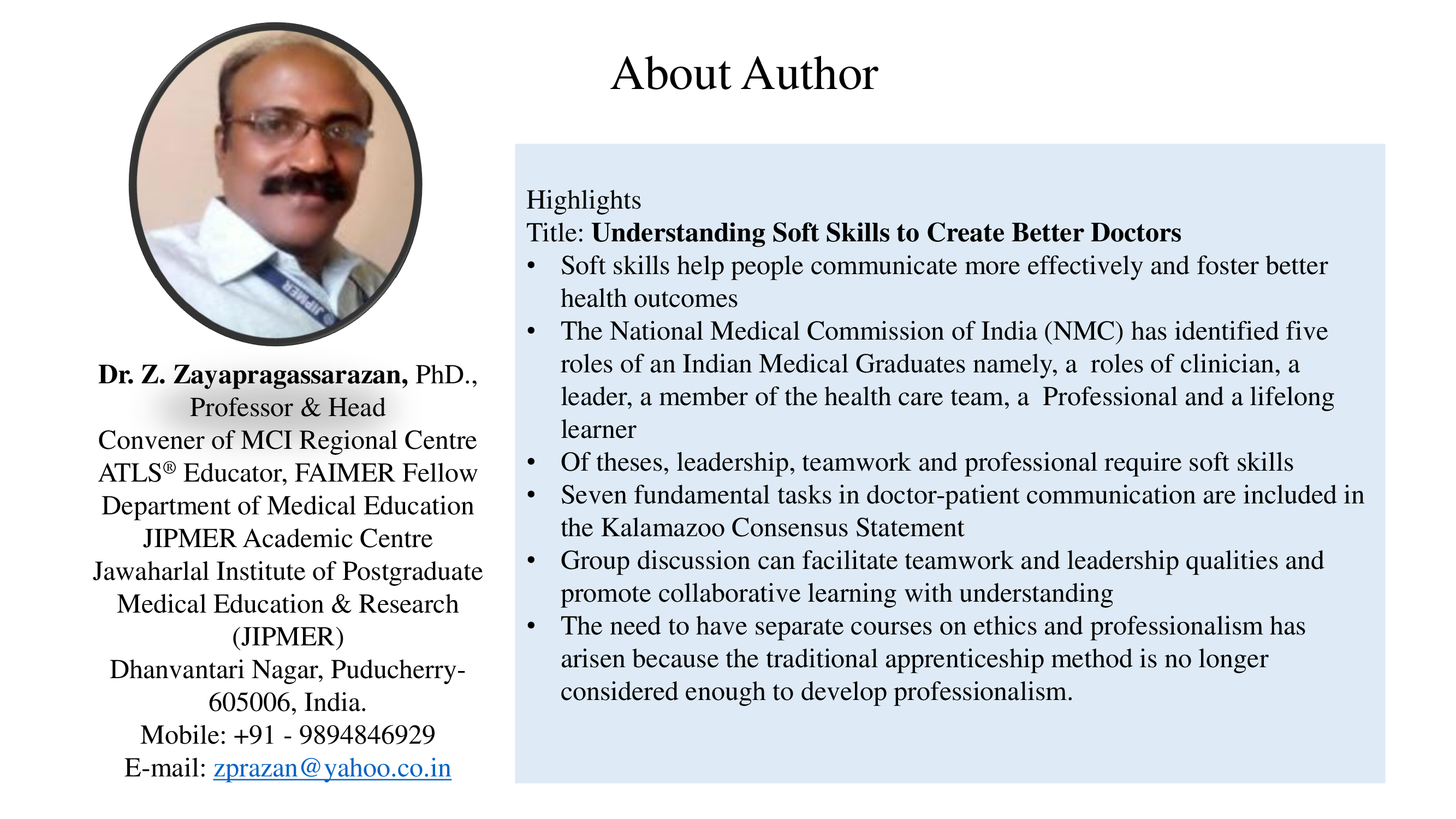Dr. Z. Zayapragassarazan
Volume 12 Issue 5 May, 2022

Introduction
Physicians with well-developed soft skills are likely to earn higher patient satisfaction scores because of their ability to establish better relationships with patients and health care teams (1). Soft skills help people communicate more effectively and foster better health outcomes. It is now agreed that medical students must also be trained in soft skills including professionalism as part of their professional training. However, medical school focuses mostly on clinical science and technical instruction with little emphasis on soft skills development among undergraduates (2). This jeopardises the preparedness of the medical graduates to play the role of a physician of first contact of community.
Various soft skills that an undergraduate medical student must develop have been listed by the World Federation for Medical Education (WFME) Global Standards, UK’s General Medical Council (GMC) and CanMEDS 2015 Physician Competency Framework. The Graduate Medical Education Regulations proposed by the National Medical Commission of India (NMC) has identified five roles of an Indian Medical Graduate to function appropriately and effectively to serve as a successful physician of first contact of the community. Of these, the roles of Communicator, Leader and member of the health care team and Professional require soft skills. The other two roles ie. the role of clinician and lifelong learner are regarded as hard skills.
Undergraduate medical training is considered as a formative period to develop soft skills such as communication skills, teamwork skills leadership skills, ethical behaviour and professionalism. Hence, to enhance the preparedness of MBBS students for professional practice, it is essential to include appropriate content, teaching-learning and assessment methods in undergraduate medical curriculum for developing these skills.
Communication skills
Communication with patients is crucial for good medical care. It is well known that effective doctor-patient communication is associated with better health outcomes, increased satisfaction for both patients and doctors and decreased risk of litigation for doctors. Clinical skills include history taking as a primary mode of communication. Seven fundamental tasks in doctor-patient communication are included in the Kalamazoo Consensus Statement (3). Active learning methods provide opportunities for students to develop good communication skills. Oral presentations by medical students, either individually or in groups, should be used often throughout the undergraduate curriculum. Group discussions will enhance active learning and communication skills in an undergraduate programme. Written assignments can assist students develop logical thinking skills and improve their written communication in English. Teachers should organise these tasks carefully and deliver them to students with written feedback for any necessary revisions. In the absence of written assignments, students’ only opportunity for written communication may be during summative assessment.
Teamwork and Leadership skills
Ability to work effectively in health care teams is an important soft skill for doctors. Teamwork and leadership skills are recognized as essential physician competency framework by NMC and other international bodies. Well conducted group discussion can facilitate teamwork and leadership qualities and promote collaborative learning with understanding. Team-based learning is an active learning method that overcomes group discussion limitations. Team-based learning can facilitate understanding concepts and their use for solving problems.
Interprofessional education promotes the collaborative practice and better health outcomes. When students from two or more professions collaborate to learn about, from and with each other fosters interprofessional education. Hence, interprofessional education should be integrated into the undergraduate medical curriculum for optimum benefit.
Leadership opportunities for medical students are usually restricted to the organization of cultural programmes in their institutes. However, it is possible to integrate leadership in the undergraduate curriculum. Students can do organization of service events as part of service-learning. Students can also lead in the organization of support activities for their peers. Group assignments and group projects also foster leadership qualities.
Professionalism
“The competence or expertise expected of a professional” is defined as professionalism. Professionalism in medicine comprises general responsibilities of a physician. These include a code of medical ethics and duties of physicians to their patients, to the public and to the paramedical profession. Some parts of professionalism such as medical ethics and consent taking have been part of the course of medical jurisprudence. The need to have separate courses on ethics and professionalism has arisen because the traditional apprenticeship method is no longer considered enough to develop professionalism. Approaches such as formal courses, role modeling and reflection have been suggested for developing professionalism. Interactive presentations, group discussions, and role plays are some of the teaching approaches used in formal courses. Trigger films can be used to start a conversation.
Conclusion
Communication skills, team-work skills, leadership skills and professionalism are essential soft skills for effective functioning of physicians. Methods are available for developing these soft skills in medical students in undergraduate medical education. Longitudinal courses for developing soft skills are to be preferred. Methods for transaction of contents, assessment strategies and the training schedule for softskills need to be specified in the undergraduate curriculum. Thus, integration of soft skills courses in undergraduate medical curriculum will lead to better health outcomes.
References
1. Boissy A, Windover AK, Bokar D, Karafa M, Neuendorf K, Frankel RM, et al. Communication Skills Training for Physicians Improves Patient Satisfaction. J Gen Intern Med [Internet]. 2016;31(7):755–61. Available from: http://www.ncbi.nlm.nih.gov/pubmed/26921153
2. Kumar A. Soft skill training a need of hour during COVID-19 pandemic. MINDS Newsl [Internet]. 2020;10(8):1–2. Available from: http://www.mindsnewsletter.com/volume-10-issue-8august/
3. Joyce BL, Steenbergh T, Scher E. Use of the kalamazoo essential elements communication checklist (adapted) in an institutional interpersonal and communication skills curriculum. J Grad Med Educ [Internet]. 2010 Jun;2(2):165–9. Available from: http://www.ncbi.nlm.nih.gov/pubmed/21975614


Soft skills may be taught by MINDS newsletter and by such other areas of learning rather than burdening the MBBS course
Thanks for your comments.
We try to accommodate articles on medical education more often.